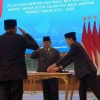Analysis of Differences between Qualitative and Quantitative Research in Educational Management
Neng Resa Rostiani / MPI Study Program / Undergraduate Student at UIN Sunan Gunung Djati Bandung
Research is a crucial pillar in the development of knowledge, including in the field of educational management. Understanding research methodology greatly determines the quality of research outcomes. In practice, there are two main approaches widely used, namely quantitative and qualitative research. Both have different paradigms, assumptions, and methods of analysis, yet they play a significant role in enriching insights into educational phenomena. This essay aims to explain the fundamental differences between quantitative and qualitative research, covering paradigms, characteristics, strengths-limitations, and their implications in educational management.
First: Research Paradigm. Quantitative research is based on a positivistic paradigm which assumes that reality is objective, singular, and measurable empirically. In contrast, qualitative research stems from a constructivist paradigm that views reality as a social construction, subjective in nature. This difference affects the way knowledge is obtained. Quantitative research maintains the researcher's distance from the object to ensure objectivity, while qualitative research requires the researcher's direct involvement with the research subjects.
Second: Research Characteristics. Quantitative research is deductive, structured, and numerical in nature. Data are collected through surveys, tests, or experiments, then analyzed statistically. The aim is to test hypotheses and generate generalizations. Meanwhile, qualitative research is inductive, flexible, and meaning-oriented. Data are obtained through narratives, interviews, and observations, then analyzed using thematic approaches. In this case, the researcher becomes the main instrument in interpreting data.
Third: Strengths and Limitations. Quantitative research excels in objectivity, measurability, and the ability to generalize findings. However, this approach is often reductive as it is less capable of capturing complex social contexts. On the other hand, qualitative research is strong in in-depth analysis, understanding meaning, and flexibility in facing field dynamics. Its limitations lie in researcher subjectivity and difficulties in generalization. Therefore, no single approach is perfect; both complement each other.
Fourth: Implications in Educational Management. In educational management, quantitative research is useful for evaluating programs, measuring policy effectiveness, and assessing learning outcomes. Qualitative research, meanwhile, is valuable in exploring leadership dynamics, organizational culture, and social interactions in schools. The use of a mixed-methods approach becomes a strategic solution to combine the strengths of both. This enables research to produce comprehensive and contextual data, making it more relevant in addressing educational challenges.
The differences between quantitative and qualitative research lie in paradigms, characteristics, and methods of analysis. Quantitative research emphasizes objectivity and generalization, while qualitative research prioritizes meaning and depth of analysis. Both have strengths and limitations that complement each other. In educational management, the choice of approach must align with the research objectives. Integration through mixed methods is an appropriate strategy to produce more applicable, valid, and useful research for educational development.
This paper is adapted from the Teaching Material of the Research Methodology in Management Course Part 4: Differences between Qualitative and Quantitative Research in Educational Management.
Lecturer: Prof. Dr. H. A. Rusdiana, M.M.
Referensi
Creswell, J. W. (2014). Research Design: Qualitative, Quantitative, and Mixed Methods Approaches. Los Angeles: Sage Publications.
Lincoln, Y. S., & Guba, E. G. (1985). Naturalistic Inquiry. Beverly Hills: Sage Publications.
Moleong, L. J. (2017). Qualitative Research Methodology. Bandung: Remaja Rosdakarya.
Sugiyono. (2017). Quantitative, Qualitative, and R&D Research Methods. Bandung: Alfabeta.
Patton, M. Q. (2002). Qualitative Research & Evaluation Methods. California: Sage Publications.
Author's Biography
Neng Resa Rostiani was born in Kampung Cijagra on December 23, 2002. She lives in Kampung Cijagra RT 16 RW 06, Ciroyom Village, Cipeundeuy Subdistrict, West Bandung Regency, West Java, Indonesia. She can be contacted via phone at 0878-3176-8639 or email at [nresarostiani@gmail.com].
Her educational journey began at Cirata Elementary School, followed by Cipeundeuy 1 Junior High School, and continued at Annaja Boarding School for senior high school. Currently, she is pursuing her undergraduate studies in the Management of Islamic Education (MPI) program at UIN Sunan Gunung Djati Bandung.
As a student, she has a strong interest in education and self-development. She actively participates in academic and organizational activities, which help her develop communication, teamwork, and time management skills. Reading is a hobby she consistently engages in, as it broadens her horizons and enhances her knowledge. With her academic background, passion for learning, and acquired skills, she is committed to continuously growing and contributing positively to both educational environments and the professional world.
Follow Instagram @kompasianacom juga Tiktok @kompasiana biar nggak ketinggalan event seru komunitas dan tips dapat cuan dari Kompasiana. Baca juga cerita inspiratif langsung dari smartphone kamu dengan bergabung di WhatsApp Channel Kompasiana di SINI







